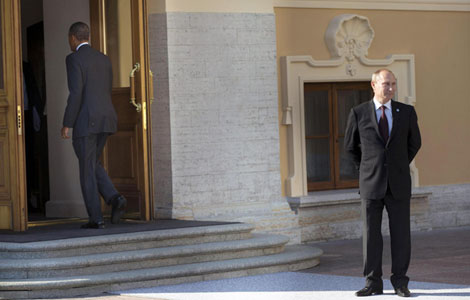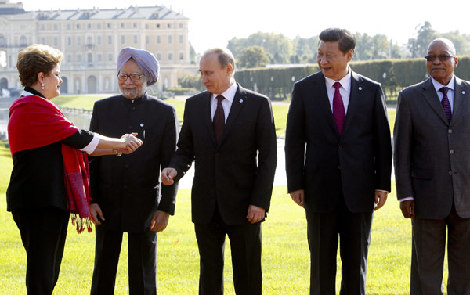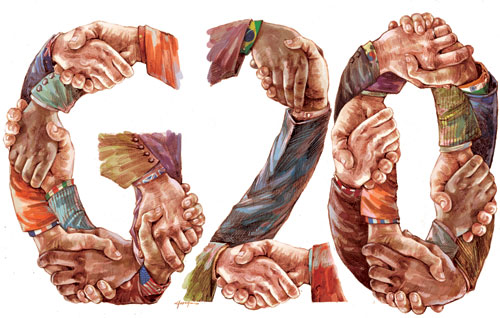Think tank seeks G20 secretariat
Updated: 2013-09-07 03:12
By Chen Jia (China Daily)
|
||||||||
A government think tank in China is calling for the establishment of a permanent secretariat for the Group of Twenty in order to implement proposals agreed upon at summits and give emerging countries a greater voice.
Wei Jianguo, secretary-general of the China Center for International Economic Exchanges, a government think tank, said a weakness in the G20 forum is that there is no secretariat. Without one, he said, the summit is simply an open platform for leaders to express opinions. Voices from developing countries often are ignored, he added.
At the G20 summits, the country that holds the presidency for the term of chairmanship appoints a temporary secretariat. Russia selected a secretariat for the summit in St. Petersburg this week.
Wei said a permanent secretariat could come up with summit agendas to help achieve a more balanced forum that pays attention to voices from both emerging and developed countries.
"(A permanent secretariat) would raise the voices of different regions," he said.
His proposal came amid the 8th G20 Leaders'Summit in Russia from Sept 5-6, which is focusing on economic growth, job creation and increasingly, the Syrian conflict.
The platform has become the premium forum for international economic cooperation after the 2008 global financial crisis. It often serves to highlight flaws in the international financial structure.
G20, whose member nations generate about 90 percent of the world’s economy, is seen as one of the most influential mechanisms in global governance.
Fang Jin, a researcher at the State Council Development Research Center, said the G20 needs reforms. It must establish procedural rules and an effective system to implement decisions made at the forum.
"It is possible to launch a voting procedure when state leaders make decisions on a specific issue because the existing consultation mechanism may become inefficient when the global financial recession ends and contradictions increase between different countries," he said.
A framework that will keep G20 members to their commitments post-summit is also necessary, Fang said.
"Because when the world’s economy is recovering, some advanced economies may step back from their commitment they made to developing countries during difficult times," he said.
Helen Clark, administrator of the United Nations Development Programme, said last week, "We depend on effective global governance to address challenges when we face an unprecedented number of shared environment, social, and economic issues."
A report from the UNDP said that China can serve as a bridge between developed and developing countries and help developing countries to be better heard at global summits.
"The recent global economic meltdown was a game-changer for China with respect to global economic governance," the report said. It also said China proved quite capable of dealing with economic turmoil.
China has become more vocal in calling for reforms in the international financial structure and for the G20 to "function as the fulcrum championing reform of the international financial order", according to the UNDP.
Fang said that the G20 should be the preferred mechanism for China to participate in global governance.
"China also has the responsibility to reform the G20 mechanism," Fang said.
The development and restructuring in the Chinese economy are expected to be the driving forces for the global economic recovery and to a rebalancing of global growth, he added.
"After mechanism reforms, the G20 will strengthen its influence and be a benefit to its members and the world," Fang said.

 Obama, Putin meet for G20 at St petersburg
Obama, Putin meet for G20 at St petersburg
 Top 10 countries for plastic surgery
Top 10 countries for plastic surgery
 Holder Murray stunned by Wawrinka
Holder Murray stunned by Wawrinka
 China, Russia a step closer on gas supply
China, Russia a step closer on gas supply
 18-year-old panda conceives triplets
18-year-old panda conceives triplets
 Testing times for G20 leaders
Testing times for G20 leaders Homemade choppers make aerobatic stunt debut
Homemade choppers make aerobatic stunt debut
 World-class partners bring NBA global games to Chinese fans
World-class partners bring NBA global games to Chinese fans
Most Viewed
Editor's Picks

|

|

|

|

|

|
Today's Top News
US military cracked most online encryption
Xi hails progress in ties as he meets Obama
MFA Lab supports Chinese filmmakers
Beijing's new product briefing a first for Apple
Renminbi moves into the top 10
Trending news across China
US services eye Chinese market
China, Russia a step closer on gas supply
US Weekly

|

|





